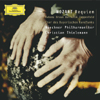Mozart Requiem
Romantic leanings but there's no denying the power of the performance
View record and artist detailsRecord and Artist Details
Composer or Director: Wolfgang Amadeus Mozart
Genre:
Vocal
Label: Deutsche Grammophon
Magazine Review Date: 12/2006
Media Format: CD or Download
Media Runtime: 54
Mastering:
Stereo
DDD
Catalogue Number: 477 5797GH

Tracks:
| Composition | Artist Credit |
|---|---|
| Requiem |
Wolfgang Amadeus Mozart, Composer
Bavarian Radio Chorus Christian Thielemann, Conductor George Zeppenfeld, Bass Lioba Braun, Mezzo soprano Munich Philharmonic Orchestra Sibylla Rubens, Soprano Steve Davislim, Tenor Wolfgang Amadeus Mozart, Composer |
Author: Richard Wigmore
If you want a grandly scaled modern version of this most-recorded of all choral works, using the traditional, unexpurgated Süssmayr text, this live performance (presumably culled from two or three separate concerts) has a lot in its favour. In his booklet-note Thielemann states his aim of reconciling the use of large forces with period-style transparency. Given the generous resonance of Munich's Philharmonie, he succeeds well enough, though the choir - generally excellent, save for moments of sagging soprano intonation - lacks ideal impact in the recorded balance.
As you might suspect, Thielemann's instincts are to mould the choral and, especially, the orchestral lines with what some might decry as an anachronistic Romantic expressiveness. True to form, he draws glowing, deep-toned playing from his Munich band; dynamic contrasts are vast, cadences - say, at the end of the opening “Requiem aeternam” - lovingly protracted. Though there is plenty of apocalyptic drama in the “Dies irae” (where the minatory timpani, played with wooden sticks, crack through the texture), Thielemann's performance tends towards the reverential, the consolatory and, notably in the “Rex tremendae”, the monumental. My own taste is for the mingled inwardness and raw, desperate intensity of Harnoncourt (DHM, 6/04), Gardiner (Philips, 11/87) and, on modern instruments, Britten (BBC Legends, 9/03). But there is no denying the power of Thielemann's vision - in the steady, sombre unfolding of the “Lacrimosa”, say, or in the inexorable build of the fugal “Kyrie eleison” and “Quam olim Abrahae”. Outstanding among his solo quartet is the true, shining soprano of Sibylla Rubens, whose anxiously beseeching “Quid sum miser” shows an acute feeling for the text I sometimes missed in the other soloists.
As you might suspect, Thielemann's instincts are to mould the choral and, especially, the orchestral lines with what some might decry as an anachronistic Romantic expressiveness. True to form, he draws glowing, deep-toned playing from his Munich band; dynamic contrasts are vast, cadences - say, at the end of the opening “Requiem aeternam” - lovingly protracted. Though there is plenty of apocalyptic drama in the “Dies irae” (where the minatory timpani, played with wooden sticks, crack through the texture), Thielemann's performance tends towards the reverential, the consolatory and, notably in the “Rex tremendae”, the monumental. My own taste is for the mingled inwardness and raw, desperate intensity of Harnoncourt (DHM, 6/04), Gardiner (Philips, 11/87) and, on modern instruments, Britten (BBC Legends, 9/03). But there is no denying the power of Thielemann's vision - in the steady, sombre unfolding of the “Lacrimosa”, say, or in the inexorable build of the fugal “Kyrie eleison” and “Quam olim Abrahae”. Outstanding among his solo quartet is the true, shining soprano of Sibylla Rubens, whose anxiously beseeching “Quid sum miser” shows an acute feeling for the text I sometimes missed in the other soloists.
Discover the world's largest classical music catalogue with Presto Music.

Gramophone Digital Club
- Digital Edition
- Digital Archive
- Reviews Database
- Full website access
From £8.75 / month
Subscribe
Gramophone Full Club
- Print Edition
- Digital Edition
- Digital Archive
- Reviews Database
- Full website access
From £11.00 / month
Subscribe
If you are a library, university or other organisation that would be interested in an institutional subscription to Gramophone please click here for further information.




